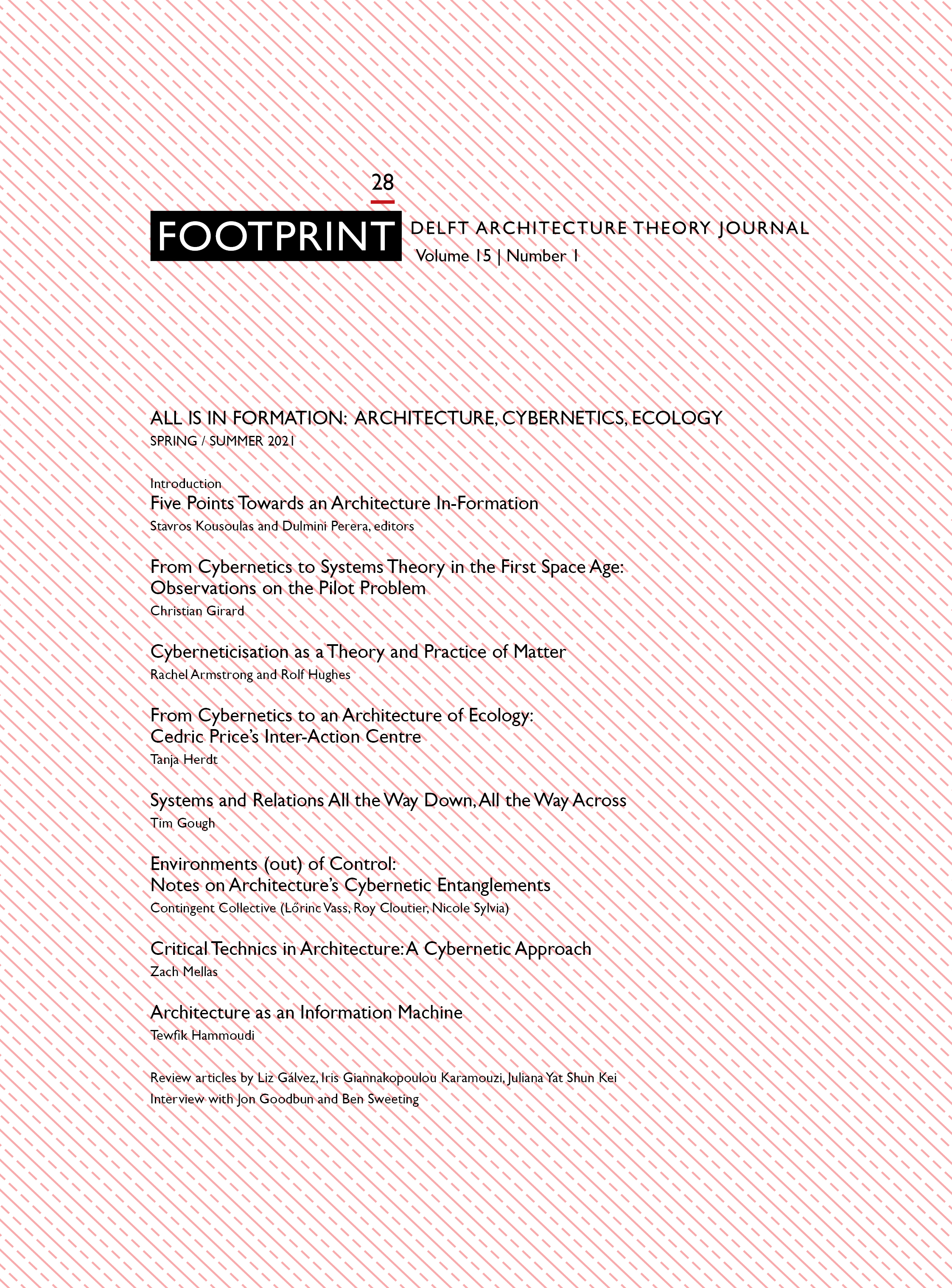Environments (out) of Control
Notes on Architecture’s Cybernetic Entanglements
DOI:
https://doi.org/10.7480/footprint.15.1.4942Abstract
This article examines the contradictory circuits of (neo)cybernetics in contemporary architectural and urbanistic discourse by reframing them within the ‘environmentalitarian’ epoch. Cybernetics is today simultaneously exalted as a liberatory mechanism for designing emergence, complexity and open-endedness, and constitutive of an indiscernible mode of decentralised, environmentally modulated control. The history of cyberneticisation has received renewed attention as the key catalyst for environmentalisation, and as the predominant control paradigm underlying late-capitalist Environmentality. Given the profound spatial implications of this trajectory, understanding architecture’s own cybernetic entanglements is a much-needed step towards a critical revaluation of environmentality. The article thus maps the cybernetic imaginary ‘at large’ across architecture – alongside landscape architecture and urbanism – under various guises such as adaptation, responsiveness, cultivation, resilience or conversation. By probing the salient characteristics of these approaches, their problematic proximity to the logic of cybernetic capitalism is contextualised in relation to the broader ontological and ontopolitical questions of the Anthropocene era. The article concludes by tracing possible conceptual trajectories amid and beyond the restrictive circuits of Environmentality: from adaptation to contingency, via Yuk Hui’s proposal for a cosmopolitics grounded in affirmative fortuity; and from responsiveness to response-ability, via Donna Haraway’s experimental material-semiotics of sympoiesis.
References
Awan, Nishat, Tatjana Schneider, and Jeremy Till. Spatial Agency: Other Ways of Doing Architecture. Abingdon, Oxon ; New York: Routledge, 2011.
Barber, Daniel. ‘Environmentalisation and Environmentality: Re-Conceiving the History of 20thc Architecture’. Design Philosophy Papers 7, no. 3 (November 2009): 145–60.
Chandler, David. Ontopolitics in the Anthropocene: An Introduction to Mapping, Sensing and Hacking. 1st ed. Abingdon, Oxon ; New York, NY : Routledge, 2018. | Series: Critical issues in global politics: Routledge, 2018.
———. ‘The Transvaluation of Critique in the Anthropocene’. Global Society 33, no. 1 (2 January 2019): 26–44.
Cloutier, Roy. ‘“Absolutely Safe, Completely Unpredictable”: Control and Indeterminacy in the Atomic Garden’. SITE Magazine 40 (2019): 92–102.
Cloutier, Roy and Nicole Sylvia. ‘Architecture After Cultivation: Four New Grids for the Great Plains’. University of British Columbia, 2016), online at <https://issuu.com/roycloutier/docs/masters_thesis_-_roy_cloutier_and_n>.
Deleuze, Gilles. ‘Postscript on the Societies of Control’. October 59 (1992): 3–7.
Dubberly, Hugh, and Paul Pangaro. ‘How Cybernetics Connects Computing, Counterculture, and Design’, 2015.
Easterling, Keller. Extrastatecraft: The Power of Infrastructure Space. London ; New York: Verso, 2014.
———. Medium Design. Moscow: Strelka Press, 2017.
Faucher, Kane X. Metastasis and Metastability: A Deleuzian Approach to Information. Rotterdam: Sense Publishers, 2013.
Fischer, Thomas, and Christiane M Herr, eds. Design Cybernetics: Navigating the New. Cham, Switzerland: Springer, 2019.
Galloway, Alexander R., and Eugene Thacker. The Exploit: A Theory of Networks. Minneapolis: University of Minnesota Press, 2007.
Halpern, Orit. ‘Repeating: Cybernetic Intelligence’. In Design Technics: Archaeologies of Architectural Practice, 191–217. Eds. Zeynep Çelik Alexander and John May. Minneapolis: University of Minnesota Press, 2019).
Haraway, Donna Jeanne. Staying with the Trouble: Making Kin in the Chthulucene. Durham: Duke University Press, 2016.
Harrison, Ariane Lourie, ed. Architectural Theories of the Environment: Posthuman Territory. New York; Oxon: Routledge, 2013.
Hayles, Katherine. How We Became Posthuman: Virtual Bodies in Cybernetics, Literature, and Informatics. Chicago, Ill: University of Chicago Press, 1999.
Hayles, N. Katherine. ‘Unfinished Work: From Cyborg to Cognisphere’. Theory, Culture & Society 23, no. 7–8 (2006): 159–66.
Hörl, Erich. ‘A Thousand Ecologies: The Process of Cyberneticization and General Ecology’, 121–30, 2013.
———. ‘Luhmann, the Non-Trivial Machine and the Neocybernetic Regime of Truth’. Theory, Culture & Society 29, no. 3 (May 2012): 94–121.
———. ‘The Environmentalitarian Situation: Reflections on the Becoming-Environmental of Thinking, Power, and Capital’. Translated by Nils F. Schott. Cultural Politics 14, no. 2 (July 2018): 153–73.
Hörl, Erich, and James Burton, eds. General Ecology: The New Ecological Paradigm. London ; New York: Bloomsbury Academic, 2017.
Hui, Yuk. ‘Modulation after Control’. New Formations, no. 84–85 (Winter /Summer 2015 2014): 74–91.
———. Recursivity and Contingency. Media Philosophy. London ; New York: Rowman & Littlefield International, 2019.
Hustak, Carla, and Natasha Myers. ‘Involutionary Momentum: Affective Ecologies and the Sciences of Plant/Insect Encounters’. Differences 23, no. 3 (2012): 74–118.
May, John. ‘Afterword: Architecture in Real Time’. In Design Technics: Archaeologies of Architectural Practice, 219–243. Eds. Zeynep Çelik Alexander and John May. Minneapolis: University of Minnesota Press, 2019.
Koolhaas, Rem. ‘What Ever Happened To Urbanism’. Design Quarterly no. 164 (Spring, 1995): 1-32.
Krivý, Maroš. ‘Towards a Critique of Cybernetic Urbanism: The Smart City and the Society of Control’. Planning Theory 17, no. 1 (February 2018): 8–30.
Latour, Bruno, and Catherine Porter. Facing Gaia: Eight Lectures on the New Climatic Regime. Cambridge, UK ; Medford, MA: Polity, 2017.
Lokman, Kees. ‘Cyborg Landscapes: Choreographing Resilient Interactions between Infrastructure, Ecology, and Society’. Journal of Landscape Architecture 12, no. 1 (January 2017): 60–73.
Mills, Simon. Gilbert Simondon: Information, Technology, and Media. London: Rowman & Littlefield International, 2016.
Pask, Gordon. ‘The Architectural Relevance of Cybernetics’, 1969, 10.
Parisi, Luciana. ‘Computational logic and ecological rationality’. In General Ecology: The New Ecological Paradigm, 75–99. Eds. Erich Hörl and James Burton. London; New York: Bloomsbury Academic, 2017.
Pellizzoni, Luigi. Ontological Politics in a Disposable World: The New Mastery of Nature. London ; New York: Routledge, 2016.
Pickering, Andrew. ‘Cybernetics’. In International Encyclopedia of the Social & Behavioral Sciences, 645–50. Elsevier, 2015.
Simondon, Gilbert. L'individuation à la lumière des notions de forme et d'information. Paris: Éditions Jérôme Millon, 2005.
———. On the Mode of Existence of Technical Objects. Minneapolis: Univocal, 2017.
Spencer, Douglas. The Architecture of Neoliberalism: How Contemporary Architecture Became an Instrument of Control and Compliance. New York: Bloomsbury Academic, 2016.
Stengers, Isabelle. In Catastrophic Times: Resisting the Coming Barbarism. London: Open Humanities Press, 2015.
———. ‘The Cosmopolitical Proposal’. In Making Things Public: Atmospheres of Democracy, 994-1003. Eds. Bruno Latour and Peter Weibel. Cambridge MA: MIT Press, 2005.
Tiqqun. The Cybernetic Hypothesis. Translated by Robert Hurley. Cambridge, MA; London: Semiotext(e), 2020.
Torisson, Fredrik. ‘The Cybernetic Hypothesis & Architecture’. Histories of Postwar Architecture 1, no. 1 (2017): 1–15.
Umpleby, Stuart A., Tatiana A. Medvedeva, and Vladimir Lepskiy. ‘Recent Developments in Cybernetics, from Cognition to Social Systems’. Cybernetics and Systems 50, no. 4 (19 May 2019): 367–82.
Wark, McKenzie. A Hacker Manifesto. Cambridge, MA: Harvard University Press, 2004.
Wellesley-Miller, Sean. ‘Self-Organizing Environments’. Architectural Design, 42.5 (1972): 314–315.
Yiannoudes, Socrates. Architecture and Adaptation: From Cybernetics to Tangible Computing. New York: Routledge, 2016.
Downloads
Published
Issue
Section
License
Copyright (c) 2021 Lorinc Vass, Roy Cloutier, Nicole Sylvia, Contingent Collective

This work is licensed under a Creative Commons Attribution 4.0 International License.
- Authors retain copyright and grant the journal right of first publication with the work simultaneously licensed under a Creative Commons Attribution License that allows others to share the work with an acknowledgement of the work's authorship and initial publication in this journal.
- Authors are able to enter into separate, additional contractual arrangements for the non-exclusive distribution of the journal's published version of the work (e.g., post it to an institutional repository or publish it in a book), with an acknowledgement of its initial publication in this journal.





